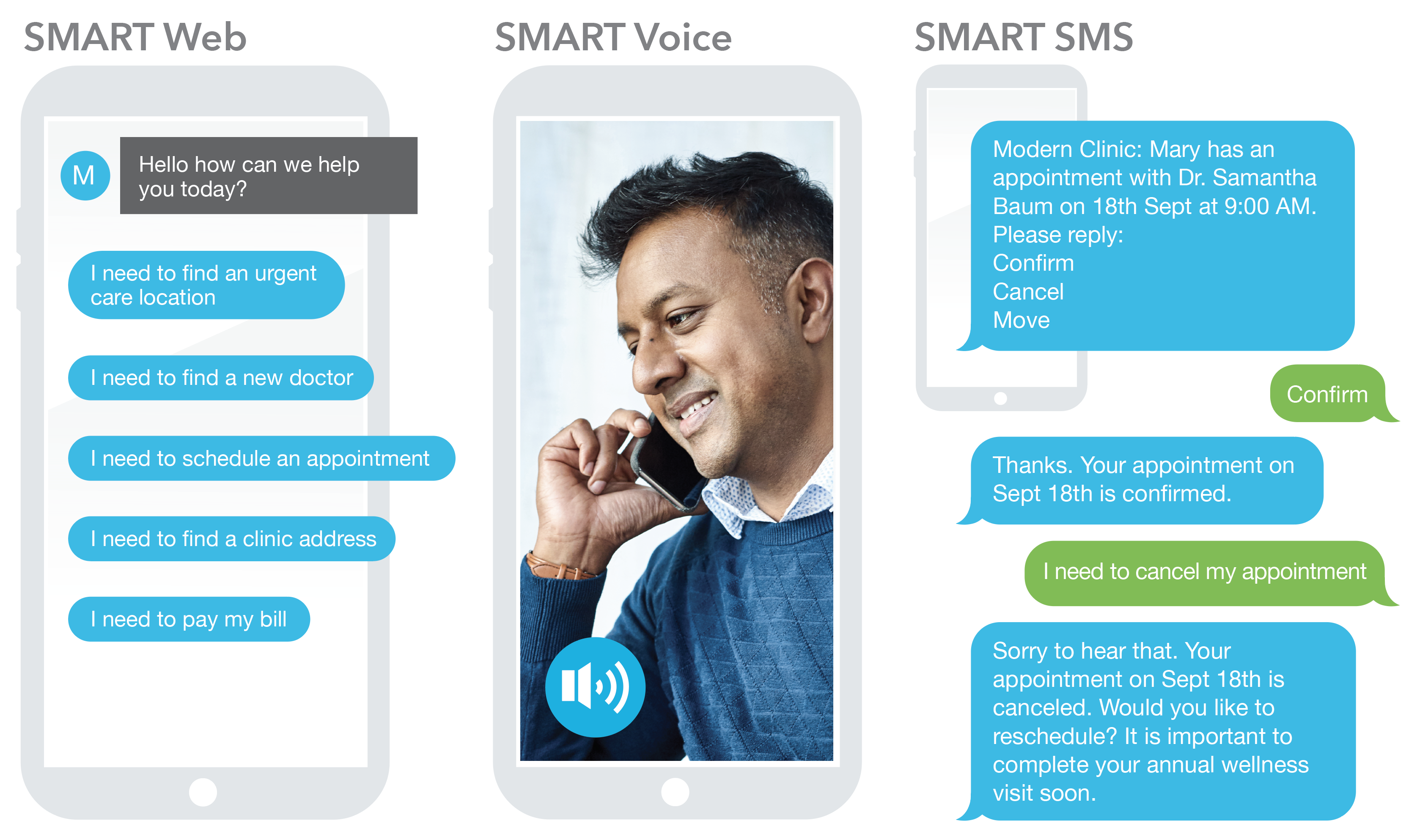Meet SMART Agent
Powered By AI
Patient Experience Begins at the Front Door:
Now Powered by AI
SMART Agent, the AI-powered concierge, transforms the patient experience with responsible AI designed specifically for the healthcare industry.
Our HIPAA-compliant virtual agent takes their queries by phone, text and online chat. With its ability to support self-service of routine EHR-integrated requests, it can schedule appointments and respond to a wide variety of inquiries — delivered with a human touch.
Next generation AI for healthcare has arrived! Discover how SMART Agent can reduce staff engagement on routine tasks and elevate patient satisfaction.

Personalized Patient Guidance, on Their Terms, for Their Comfort
SMART Agent meets patients where they are at through its unique and sophisticated omnichannel approach with options to communicate by phone, text or online chat.
How does SMART Agent work?
- Compiles a dynamic knowledge base using information that it has at its disposal as well as the latest AI-enabled capabilities to decipher the patient’s inquiry and respond with the relevant information.
- Responsible AI connects to an ecosystem of authorized resources — including your website and the patient’s health record — to collect the information.
- Enables self-service, reducing the need to disrupt your staff for common tasks.
- Dynamically directs the patients to the right resource where appropriate.
With every encounter, SMART Agent is a reliable source of answers on demand. When patients get the information they need, when they need it, without waiting on hold or leaving voicemails, it makes a profound impact on their experience with your health system.
Spend Less Time on Routine Inquiries, Focus More on Care
With shortages and burnout fueling a staffing crisis in healthcare, resources are spread thin. The SMART Agent relieves the burden with call deflection that answers patient inquiries and completes simple tasks. When your people gain more time to focus on urgent matters, they’ll feel more effective in their roles, which is critical to satisfaction at work.
Learn about the pressures on healthcare staff and how it’s hurting patient loyalty by downloading our brochure.
How Does SMART Agent Provide Self-Service Healthcare?
Day or night, SMART Agent provides a digital front door that’s always open to patients, ready to field requests at each step of the patient journey — before, during and after the visit.
Answers a wide range of FAQs sourced from your website, with zero setup from your IT department.

- Appointment management: AI scheduling assistant empowers patients to look up, confirm, cancel and reschedule appointments.
- Bill pay: Integrates with revenue management systems to answer inquiries and accept payments.*
- Prescription refill: Prescription management and support without tying up staff time.
- Procedure eligibility & estimates: Insurance eligibility and estimates for procedures and services.*
(*Coming Soon, 2023)

Extracts and analyzes data from patient queries and fills information gaps on the website to cultivate and improve patient experiences and alleviate burden on staff answering repetitive questions.

SMART Agent- AI Enhanced Communications

Simple Transactional messaging may be traditional, but it has limitations. The scope of assistance is confined to a rule-based narrow range of topics, fixed responses, and many lack integration with EHR systems offering little relief to staff workloads.
However, with its unparalleled intelligence, SMART Agent sets a new standard for messaging. Unlike basic messaging, SMART Agent seamlessly integrates with the EHR and published resources, employing AI to identify the right information and actions your patient needs.
With this powerful combination of capabilities, SMART Agent offers an exceptional virtual persistent, actionable, and conversational experience that surpasses all others.





